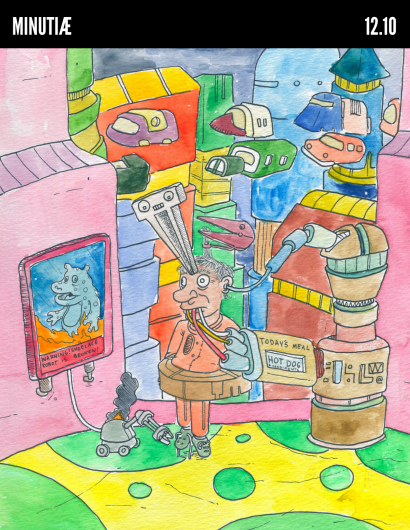It’s Gotten Better
by Danny Cohen
At McKintley High School, outside of Boston, a new wave of equality is taking over the student body. After a tumultuous three years of increasingly emotional bullying, cafeteria and after school fights, eating disorders and hierarchies upon hierarchies based on shirt or bracelet color, parents and students have had enough.
An overwhelming outcry from parents has flooded the PTA meetings in recent weeks. The parents’ attendance has been the largest for any school-related event ever. “Yes, usually I’m working late in the city,” says Shannon Colman, a corporate lawyer who leaves before her kids wake up and regularly comes home after 9 PM, “but this is important. I need to ensure that when I pass my kids off to school, they be treated as best as possible.”
“We’re bringing everyone up to the highest common denominator. We looked at what was going on,” says Principal Lennon, “and we’re now we’re implementing a whole new set of guidelines. We, as educators, need to recognize that the natural progression of teaching children means that these children, they are all the same, and we don’t care if you’re black or white or rich or poor or have a severe learning disability and probably shouldn’t be in the same classes, everyone is in the same classes.”
For instance, all students have been placed in the advanced tracks for reading and writing. While this has certainly boosted the self-esteem of many students, it has resulted in under qualified teachers struggling to teach struggling students. Lennon explains that, “while it’s important the kids learn, it’s more important they’re feeling they’re learning.”
McKintley administration officials went even further than just using the traditional equalizing tactics such as school uniforms or consolidating water fountains. The dress code, or “ensemble pillars,” is based on the most recent Urban Outfitters styles. Anything that is on an Urban Outfitters mannequin is allowed.
“Before,” says Principal Lennon, “the most popular girls would be were wearing purples and blues, and colors such as green were relegated, were associated with the more quiet kids. It’d be easy to pick out a nerd from a hot girl. Now, everyone is wearing hip colors and the latest cuts of jeans.” He shows me his own “ensemble” of chinos, a solid purple shirt, wool pea coat and black and white keffiyeh. “Even me, the principal, feels cool like everyone else.”
Not everyone, though, can see the enlightenment. “Look, this is ridiculous,” cries James Amerson, a stuffy child psychologist at Harvard specializing in lower education, “this isn’t helping anyone, least of all the children. Of course I don’t like how kids are emotionally tormented, but the fix is not to make schools artificial worlds of equality, but rather to hold parents accountable, to make sure their kids aren’t jerks. No one is listening to me. It’s the parent’s faults that they are letting their children be bad humans.”
Meanwhile, during recess at McKintley, students are not allowed to talk to any one person for more than fifteen minutes at a time. Friendship Advisors roam the cafeteria and hallways ensuring that close friendships do not form, which could later mature into cliques. Furthermore, to counteract discomfort and bullying that can arise from homosexual relationships, a “Full Court Kindness” policy has been enacted. If any student, regardless of sexual orientation or intent, hugs one person, they have to hug everyone. Within three weeks, there was no more hugging.
“Please. Please let these kids form strong friendships and failed relationships,” Amerson goes on, “They’re going to be social aliens, or coddled adults. As soon as they receive a letter of rejection or they don’t get hired, we’re going to have grown people weeping in the streets.”
Upcoming plans include giving A’s to each student, placing them all at the top of the class; adding the entire student body to the each sport teams’ roster; subsidizing fancy meals in the cafeteria; stilts for shorter students; a 550-strong cast for A Chorus Line this spring; and, lastly, blue colored contact lenses, since, “[they] all deserve to be on an equal playing field of having someone lost in their dramatically soulful eyes.”
“It used to be that nearly 30% of the kids were really dragging down the school’s self-esteem quotient, but now it’s fairly normalized, right at the top.” Principal Lennon cites the Line Dance Prom as a “the real deal” equalizer. “There’s a very strict list of songs that can be played at our school dances. All students spend their gym periods learning dances to the songs so when played at the dance they all synchronize beautifully. Some of our alternatively abled students do have to wear exoskeletons to help them move, but still, everyone ends up looking like Usher.” The dances last for hours, allowing for each child’s solo in the middle of a giant circle made up of all the other students.
Shannon Colman is all for it. “It sounds like the right thing for my children,” Colman says over the phone while rushing from her important office to a lunch-time rendezvous on the east side of town, “My children deserve to be as unique as everyone else.” ♦
